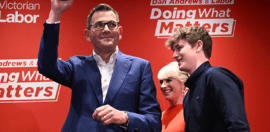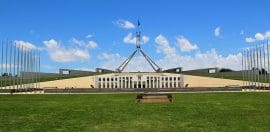Australia’s COVID response could be undermining democracy. Why is civil society staying silent?

Photo by Paul-Alain Hunt on Unsplash.
13 September 2021 at 5:02 pm
The social sector needs to find the will to drive politicians to deliver funding and policy decisions that will lead us to build back better, write Neil Pharaoh and Angus Crowther.
I have actively avoided most things COVID in my recent articles for Pro Bono News, however one of the most impactful articles I’ve read of late was by Tim Soutphommasane and Marc Stears on ABC entitled Government responses to COVID-19 are undermining our democratic commitments – why have progressives remained silent? Soutphommasane is the former race discrimination commissioner and Stears is the director of Sydney Policy Lab at University of Sydney.
I would really encourage everyone in civil society to read it. In short, it talks to the temporary becoming permanent, and what started as proportionate becoming repressive. It talks about Melbourne, now officially the most locked-down city in the world, and the military-like presence of police on our streets. Plus, curfews and refused permissions to leave the country, added to the mix.
The key concern raised by Soutphommasane and Stears is where are the progressives? It appears it is our more “progressive” governments which want to see more “Fortress Australia”, whether it be reduced numbers of Australians returning home; acceptance of lockdowns “the harder, the better”; and left wing scepticism on easing of restrictions. Couple this with the polar extremes on social media – which make you think COVID is either death or lockdowns – as well as a parallel immigration debate about borders reopening, and we are in a bit of a pickle.
Of even more concern is “zero-COVID thinking”, as expressed in this section from the article:
“More potent still is the strain of ‘zero-COVID’ thinking that has infected large segments of the Australian left. In part a reaction against the Morrison government, and manifested as dogmatic backing of Labor state governments pursuing lockdowns, the Australian centre-left continues to offer loud support for a long-term elimination strategy to the virus. Any challenge to this right now invites charges about reckless intent.”
Soutphommasane and Stears conclude, and I agree, that the pandemic is corrosive to democracy – inequalities have widened, protectionism is back in vogue, internationalism and multiculturalism has been parked. Apparently progressive first ministers in Australia are using fear and scare mongering as opposed to leadership (NZ is an example of hope and aspirations as opposed to the naughty children lecture we get every day).
So this begs the question, what should civil society and the social purpose sector do?
Firstly, we need to start talking; secondly, we need to insert some rationality into the debate; and thirdly, we should start to map a course out of this pickle, or else the reforms and ambitions we have will be shelved for decades – with those ambitions of “Build Back Better” diminishing in the rearview mirror.
We need to start talking.
Whether it be parliaments not sitting, judicial cases being delayed, or children with parents in prison not being allowed to see them – we need to start discussing the real world again. I am involved in an arts organisation which has had next to no government assistance, despite screaming political types saying arts are being supported. I have seen business get no assistance, yet the political types are saying support is there. More critically, in some of the organisations we work with, death and major injury rates are doubling due to COVID. These stories need to start being told – I suspect the “progressive political class”, which is too often belligerently slamming anyone who doesn’t swallow COVID-zero, has never had to depend on a grant application, or selling a product, for their income and livelihoods.
We need to insert some rationality into the debate.
Across the social purpose landscape we deal with some very cutting edge problems, and our clients and constituents are rarely “the worried well”. Yet social purpose organisations are told government won’t/can’t fund projects which save lives, or improve life trajectories when they cost mere thousands or tens of thousands per year.
We (through the Pharmaceutical Benefits Scheme) restrict access to drugs based on what is called a quality adjusted life year (QALY); in short, if a drug costs more than a certain amount (circa $100,000 per annum in Australia) even if it can save your life, we do not spend the money.
The inverse of this is COVID, where depending on who is doing the maths, we are spending between $7.5 million and $330 million per life saved. We do not like talking about life, money and ethics, but we also need to remember that almost 500 Australians die every single day – almost 100 of them from preventable or accidental deaths.
In rounding out the rationality discussion, we need to look at the recently published ABS data on deaths last year. There were 3,500 “excess deaths” in the year since lockdowns began – 1,000 of these were from COVID, but here is the kicker, 2,500 of these were from increases (against previous year trends) of cancer, dementia, diabetes and other illness categories. You read those stats right, it appears that lockdown may have caused 2.5 times more deaths because of delayed treatment and delays in detection, than deaths from COVID itself.
We need to start talking beyond COVID.
Soutphommasane and Stears mention that initially we have grand ambitions of building back a better world after COVID – focusing on inequalities, climate change, and large structural issues in our economies. We need to remember that while we are all tired, irritable, frustrated, we also need to have that ambition back as a sector. We need to demand big changes, and not a return to business as usual – we want the “no child lives in poverty”, we want more international aid, and more action on climate change, we want changes in family violence and improvements to mental health. Unless we step up our ambition, very soon we will revert back to a new normal, with all the same problems as before, just with even less money to spend on them (courtesy of almost $1 trillion, yes trillion, in COVID related costs).
And this is the argument the social sector needs to make – governments cry poor and don’t fund (or under fund) critically important programs all the time, but when it’s COVID there are rivers of money to be found. The reality is that government decisions are made where there is political will, and the social sector needs to find its own will to drive politicians to deliver funding and policy decisions that will lead us to build back better. With a federal election on the cards by May 2022, the sector needs to get moving and ask what it’s prepared to accept – and campaign hard on those things that it cannot accept.
The progressive movement is more than just one person, or one premier – we need to start charting a course forward, or else all of the causes we care about will be lost in the wash.
About the authors: Neil Pharaoh and Angus Crowther have spent most of their voluntary and professional life in and around social purpose organisations, government, public policy and advocacy. Neil has been behind many leading social policy and advocacy campaigns on gender rights, equality, medical research and education, and ran for Parliament in Victoria in 2014 and 2018. Angus was a ministerial advisor and staffer. Neil and Angus are both co-founders and directors of Tanck, which focuses on better engagement with government, and they regularly run workshops and advocacy sessions and advise leading social purpose organisations on their government engagement strategy and systems.
Happenings on the hill is a fortnightly column focusing on all things politics, policy, campaigns and advocacy. Stay tuned for updates around political trends and elections, lobbying and advocacy news, and hints, tips and ideas on government engagement that are specifically written for the social purpose/for purpose sector.
If you have any ideas, suggestions, tips or questions, please feel free to email Neil Pharaoh at neil@tanck.com.au or reach out to him via social media at LinkedIn, Twitter, Instagram and Facebook.








